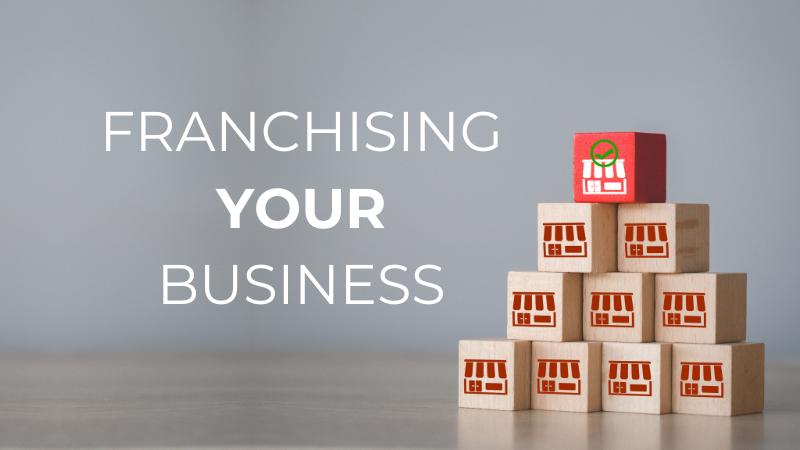If you are looking to expand your business and brand and are thinking about franchising as an option, there are a few things you should consider. This method of expansion requires careful planning and strict legal processes to become successful so it’s important to do your research before starting the franchising process.
In this article, we dive into the key aspects of franchising a business, from understanding franchising and legal considerations to challenges you may face.
What is a franchise?
A franchise is a business model that allows individuals referred to as franchisees, to pay an initial fee to a company (the franchisor), to run their own business using the name, brand and framework of the franchisor, an already established business.
The advantages of franchising your business
Although franchising is an excellent way of expanding a business that is already successful, it is not suitable for every business and by understanding the advantages and disadvantages, it will help you to decide if franchising is a suitable option. Advantages include;
- Business growth
- Initial cash injection from the franchise fee
- Steady cashflow from royalties
- No direct managing responsibilities
- Brand development
- Motivated franchisees
- Increased purchasing power
- The contribution of ideas from franchisees
- Extra management support from franchisees
The disadvantages of franchising your business
It should be recognised that franchising is not a fix for a failing business or a solution to provide injections of capital from franchisees because your business is in difficulty. You should only go down the franchise route if you already have a successful business up and running.
As well as advantages, there are also disadvantages that should be considered such as;
- The financial investment to set up the model
- Legal fees
- Marketing costs
- Recruitment costs
- Time to set up the franchise model
- Finding suitable franchisees
- Training
- Supporting your franchisees
- Sharing confidential information
- Lack of direct control over franchisees
- Potential damage to reputation through franchisee actions
Franchising your business will involve significant time and financial investment at the outset to get a model in place for future growth. You will also have to develop and deliver various training and give support to your franchisees to successfully sell your brand.
Your existing business needs to have systems and procedures in place that can be copied and followed by the franchisees to allow them to run their business successfully and this takes careful consideration and time.
Is franchising an option for your business?
Franchising is a popular business model that has been around for decades. It’s a proven and successful way to grow your business by providing the infrastructure and support for other people to run their own companies under your brand.
There are many advantages and disadvantages of franchising, and it is important to understand if your business is suitable.
Generally, a business can be considered franchise-ready if it:
- Has a proven, profitable and scalable business model
- Uses processes that can be replicated between branches
- Has good brand recognition and demand in the market
- Can provide easy training and operations
However, if you’re looking for complete control over your company’s future, then this might not be the best option.
Potential challenges
Franchising a business, while exciting and an excellent opportunity for growth, also comes with its own challenges, the most prominent one being brand consistency. Running a business across a range of locations with multiple franchisees can lead to variations in customer experience, with franchisees putting their own spin on your brand or hurting your business identity. It is therefore crucial to find the right franchise partners as not every prospective franchisee will have the right skills or dedication to ensure the brand’s reputation is not damaged.
Similarly, providing ongoing support and training for franchisees can prove difficult with businesses updating strategies, operations and guidelines whilst balancing control and independence. Finding the right balance between running your franchise and letting your franchisees have the flexibility to adapt to local markets is a tough job.
The Legal bit
Before starting any franchise, you need to understand the legal procedures and requirements you should have in place.
- Franchise Agreement – this will set out the fees, rights, responsibilities and include clauses regarding termination between the franchisor and franchisee, in a legally binding agreement. The agreement must also be drafted to avoid any breaches of UK competition law.
- Intellectual Property – ensure all trademarks are registered to protect branding, logos and business identity
- Franchise Disclosure & consumer protection – although this doesn’t fall within the legal requirements, it is always advisable to have financial and operational transparency.
- Employment Law – as with any business, you must adhere to any applicable employment laws. For more information on how we can help with this, visit our Employment Law for employers web page.
- Finance & funding – whether you are using personal savings, loans or bank financing or the existing cashflow of the business to get it in a suitable position for franchising, ensure you speak to a professional for advice.
- Exit strategy & disputes – having the necessary agreements in place covering resale rights, termination conditions and procedures will help avoid and resolve any future disputes.
It is important to ensure you are compliant with legal and regulatory requirements, so having a legal professional to advise you is always a good way to avoid unnecessary challenges or hiccups.
How Backhouse can help:
If you are considering franchising as an option to expand your business, we can help. From drafting the necessary documents and agreements to providing tailored advice, our team are experts in Commercial Law. Contact us today and book your free 30-minute consultation.
Tel: 01245 893400
Email: info@backhouse-solicitors.co.uk
Visit: 17 Duke Street, Chelmsford, CM1 1JU
Or send us a message through the Contact Us page on this website.






